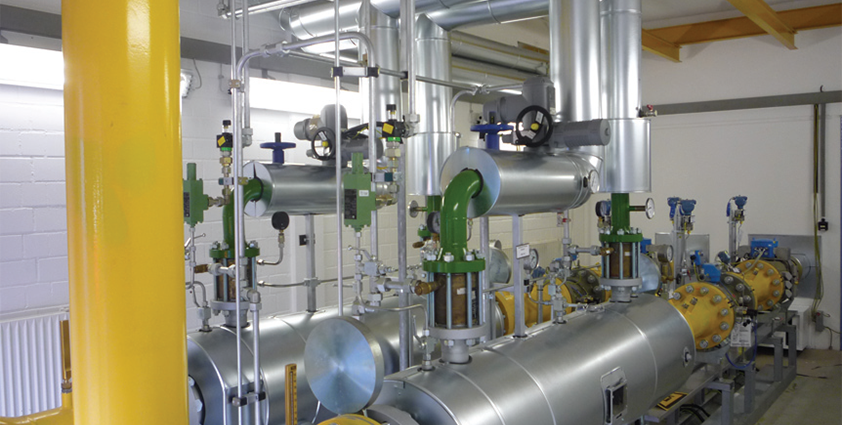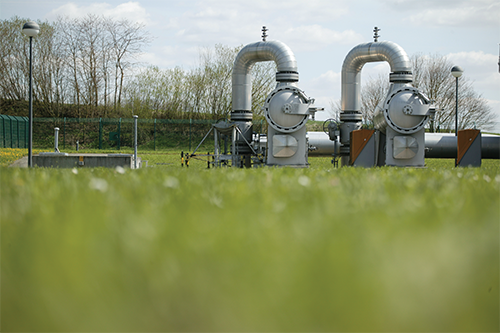
Bayerngas GmbH
A natural talent
Based in Bavaria, Bayerngas GmbH acts as a gateway to the international gas procurement market for its partners, drawing strength from its infrastructure, instruments and knowledge.
It is the communal gas procurement platform for its municipal shareholder customers, its regional shareholder customer from Tirol, as well as for its regional providers and major industrial customers.
Through its holdings and affiliates, the company is engaged in national and international markets, and supports its municipal partners in developing their markets. It also creates innovative products and bundles the gas requirements of its shareholders/customers, purchases natural gas across all value added stages of the procurement chain and is actively involved in the exploration and production sector.
In terms of its services, Bayerngas offers expertise relating to procurement, sales and marketing, network access, transportation and storage; suitable storage capacities to support importing, trading and distribution activities; and risk minimising accounting grid management.
“We are a fully vertical integrated gas company, so we stick to natural gas, starting with exploration and production,” reveals managing director Marc Hall. ”Our activities are mainly in the North Sea and we’re based in Norway, Denmark and the UK. Additionally, we have some smaller E&P activities in south Germany, where we have underground storage.
 “We operate a pipeline system, which is unbundled but 100 per cent owned by Bayerngas. Our main business is procurement of natural gas for southern German municipalities, which are also our shareholders. We have one shareholder in Austria as well, called TIGAS, which is the natural gas branch of TIWG and this is one of the major hydropark producers in Central Europe.”
“We operate a pipeline system, which is unbundled but 100 per cent owned by Bayerngas. Our main business is procurement of natural gas for southern German municipalities, which are also our shareholders. We have one shareholder in Austria as well, called TIGAS, which is the natural gas branch of TIWG and this is one of the major hydropark producers in Central Europe.”
Marc elaborates on the pipeline system: “It’s a high pressure transport system in southern Germany; we have an importing point from and to Austria where gas from Russia comes into southern Germany and we supply the southern region. A few years ago we partnered E.On Gastransport and organised one market area, in order to give shippers better access in the different market zones.
“We’re very happy with this co-operation; independent network operators were not well-connected areas, in market terms, so we have found ourselves in a common market area and now three other network operators are entering into this partnership. This is the first consolidation phase – to get all the networks into one market area or zone – and next there’ll be integrated movements between the network operators.”
“It’s low risk to be invested in networks with a constant regulated return whereas in upstream it’s more risky but with a better return. Bayerngas is a downstream base in southern Germany and there’s a degree of security, regarding demand, due to us supplying the municipalities. Strong industrial consumers surround most of the areas and cities, which provides strength for us. We’re constantly enhancing our efforts to become an overall German supplier.”
Discussing Bayerngas’ procurement model and strategy, Marc notes: “The tradition was an easy one; we procured all the natural gas on the market in Germany. In the past, there was only one supplier in our portfolio but now we have about 15, and in the future this number will increase. Also, the packages we’re buying will be smaller and there’s more procuring and trading on the market.”
Continuing, he adds: “International procurement is interesting to us; in the first run it will be straightforward procurement from the North Sea, where we’re in partnerships with other producers. As we’re in a southeast area in Central Europe, the next step for Bayerngas will be the connection to Caspian and Middle Eastern sources. Bundling the municipal interests in Germany will provide a good partner for Caspian and Middle East resources.”
In terms of Bayerngas’ ambitious exploration and production activities, which started in 2006, this year investment will pass the one billion euro mark. “We have a small oil production and two gas productions coming on-stream in 2010,” Marc reports. “We’re keen for our acreage to reach 1.5 or two BCMA production per year, in two or three years, which constitutes ten per cent of our portfolio.”
The future of energy consumption is much debated with opposing views proposed. One idea is to substitute nuclear power plants with natural gas power plants. “There are ideas to get all the natural gas out of households and industry, and use it purely for power plants, which would mean a complete shift from the heating sector to the power sector,” Marc explains. “This may mean that by 2050 that there would be no natural gas in German households.”
Bayerngas prefers an alternative view, whereby natural gas doesn’t solve all the world’s energy problems but has potential for the heating sector. Marc says: “Natural gas can partner renewable forms of energy; we see a future in power production but don’t subscribe to the radical view that nuclear power plants can be replaced with natural gas units. We think a power and heat combination is more sensible.”
Continuing to consider the future of Bayerngas, Marc concludes: “Rather than staying fixed in the traditional model, we have diversified along the value chain, professionalised and internationalised. We’ve developed from working solely in the south of Germany to operating in what we call the German-speaking world – Germany, Austria, northern Italy, Switzerland and parts of Benelux. We’re well positioned in this market and we’re one of the stronger gas companies in central Europe.”
Bayerngas GmbH
Services: Procuring natural gas and optimising supply conditions